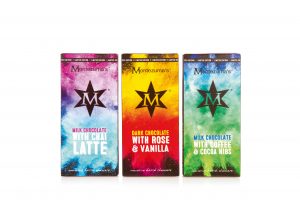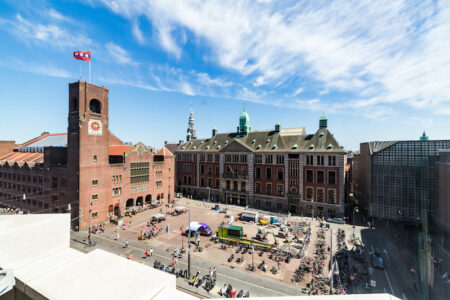Montezuma’s delivers South American flair with a distinctive British twist

Building a confectionery business from the ground-up to become a company with a £10 million turnover has proved a considerable undertaking, as Helen and Simon Pattinson of UK-based Montezuma’s chocolates explain to Neill Barston
After placing considerable energy into studying for law qualifications, Helen and Simon Pattinson realised that an intense life in the legal profession just wasn’t right for them.
The West-Sussex based couple opted to take a year out, which by their own admission may seem clichéd, yet it was to prove exactly the inspiration they needed.
Their time spent travelling in South America soon revealed they were destined to enter the confectionery world, encountering communities producing exceptional chocolate in time-honoured traditions dating back thousands of years.
Their experiences in 1999 could easily have proved merely a diverting ‘adult gap year,’ but their decision to re-evaluate their lives was to lay the foundations for their own company, Montezuma’s. As they explain, at that time, the market for luxury independently-produced chocolate was comparatively limited, opening up a clear gap in the market.
“During our year of travelling we were mainly in Argentina, Chile and Venezuela, where we discovered cocoa and chocolate, and everything that makes it amazing.
“We ended up on a cocoa plantation in Venezuela for a couple of days, where they were drying beans on a tarmac road, but to see that process was incredibly, to see how basic an ingredient it is and how tricky it is to farm, and to contrast that with the amazing chocolate they were producing – particularly in Argentina,” explains Helen, who says it was experiencing the latter country, stumbling across a small, remote town that had an unlikely total of 10 chocolate stores, that provided their own creative spark in believing that the qualities of South American chocolate could be replicated back home.
Fast forward nearly 20 years, and their business is now turning over around £10 million a year, employing 150 people, with export operations to 25 countries.
This includes its largest overseas territory, America, which has been secured two years ago with a distribution deal with major retail store Trader Joe’s, which the couple says has proved a particular success in a short period of time.

As Helen Pattinson explains, building the brand has taken considerable time and effort, but she feels it’s been completely worth it in seeing a strong take-up in its series of products. The company now produces chocolate for several major UK supermarkets from its facilities at Birdham, near the picture-postcard cathedral city of Chichester in West Sussex.
According to its co-founder adds, while there was much excitement about setting the wheels of the business in motion, their initial experiences threw up more hurdles than they anticipated.
“When we first set up the business, we had never intended to be manufacturers, even before we opened the first shop, we had to start making the chocolate ourselves as the producer we had found went bust before we opened our first store in Brighton.
“We phoned around producers and the biggest one had gone under and we knew there was nobody else that could do what we wanted to, so we ended up teaching ourselves how to make chocolate very quickly,” reveals the entrepreneur, who admits their early setback for the company’s initial outsourced production plans was ‘something of a nightmare,’ yet an experience that only served to strengthen their sense of resolve.
Twists and turns
As the company’s founders explain, there have been some twists and turns along the way over the past two decades, including moving production facilities to expanded site, but they say the hard work has paid off.
This has especially been the case in terms of product development, as in producing its own chocolate, the team has been fast in responding to market demand in bringing out new series of bars and limited edition confectionery that changes seasonally. As Helen adds, the company, which now has five retail stores, has been keen to respond to specific confectionery trends, positioning itself as a premium brand offering a distinctive series of bars inspired by South American flavours.
“When we started out we were lawyers and knew nothing about chocolate, or running a business, so there was a lot to learn, and we are actually still learning.
“As you grow as a company there are new challenges all the time, which makes it all fun, which is the key for us. No day has ever been the same here, which makes things really interesting. We get to eat chocolate all day – which I never tire of,” enthuses Helen, who says the company has a very positive recruitment policy that centres on a culture of working hard and playing hard.
Production in full flow
During our tour of the company’s relatively compact site, measuring around 23,000 square foot, its range of production lines are being fully put through their paces.
These include Knobel depositing and moulding lines, which make-up the core of its equipment series, with the company having built up a strong working relationship with the Swiss-based equipment manufacturer over the years. In addition, the business also uses AMP Rose packaging lines and vertical weighing systems that have scaled up as the business has grown.
From its humble origins, the company is now producing in the region of 500 tonnes of chocolate a year, which may be some distance to catch up with global producers, but it’s steadily increasing.
As Simon Pattinson explains, he has taken a particular interest in the technical machinery side of the business. He reserves particular praise for the company’s Knobel systems, which he says have become a well-established favourite of the company.
“If you ring them up in Switzerland with any issues, then they can have someone out to service the equipment the next day – that might be costly, but that kind of support is really important,” says the co-founder of the business.
He explains they have learned plenty as they’ve gone along in terms of devising best practice for production techniques and making the most of their site. Significantly, his co-founder notes there continues to be a noted pattern of growth across its confectionery range, including from its customers in the US.

The agreement marks a considerable landmark for the business, potentially opening up even further growth that they hope could eventually fund the development of brand-new production facilities for the business.
“It’s really exciting supply Trader Joe’s with one of our bars and truffles, they are fantastic to work with and open to new ideas and send them lots of new product we are developing. The level of business is large, they have 450 stores around the states,” the director.
“The response has been really good- the feedback from US customers is amazing. They are very vocal on Facebook, we sell online and our US business there has increased exponentially because of that. It’s had a fantastic knock-on effect. We are looking at how to grow that US business even more in a way that meets customers’ needs.”
In terms of finding a balance between work and their personal lives, the couple admit that the boundaries between work and home life often blur. While it seems their three daughters approve of having mum and dad owning a chocolate factory as it has leant them some ‘added playground credibility,’ Helen concedes that the trio often jokingly tease their parents that their favourite chocolate is anything other than the family’s own brand.
On their development, the director adds that its product portfolio has been constantly evolving over the years, which she says has proved one of the most enjoyable aspects in tracking the market for new product development. Though there is a constant stream of inventive new bar varieties ranging from Chai Latte milk chocolate, mini ‘chocolate library gift sets’ and vegan and organic truffles through to dark chocolate with rose and vanilla, some of its original offerings are still on sale, including a 74% cocoa dark chocolate.
Trading fairly
As she adds, the company has placed considerable effort into ethical sourcing of cocoa, and has its own policy of ‘trading fairly’ rather than being associated directly with the Fair Trade organisation.
“A lot of our cocoa production is from small plantations in Venezuela and Peru run as co-operatives, where they look after each other. The sellers are co-ops to, which helps them get their prices at a premium, and are paid above Fair Trade prices,” explains Pattinson, who says she remains deeply concerned by the range of welfare issues that remain with the supply chain on a global level.
There remain plenty of other challenges on the horizon – ranging from the impact of Brexit affecting its trading exchanges within Europe, through to how to meet rising concerns over obesity and sugar reduction within product ranges.
On the latter issue, she says confectionery should always be seen as a luxury occasional treat, and highlights the fact that its best-selling bars- the dark chocolate range made with 70% cocoa, are completely free from added sugar.
The company has also responded strongly to consumer trends in terms of vegan product ranges – which are an increasingly prominent part of their activities.
“We’ve found the vegan market demand is growing hugely, had a great vegan fanbase, but more and more, they might not be 100% vegan, or aspire to be, so we fit that mould brilliantly, as all our dark bars are suitable for them.
“We are proud of our production here – and our goal is to be Britain’s greatest little chocolate company. To me, that means we are available to all, but still have those family values and are a friendly team. You can achieve both, but careful about how you grow,” enthuses the director of their ever-expanding operations that have seen them gain a foothold in markets around the world.



